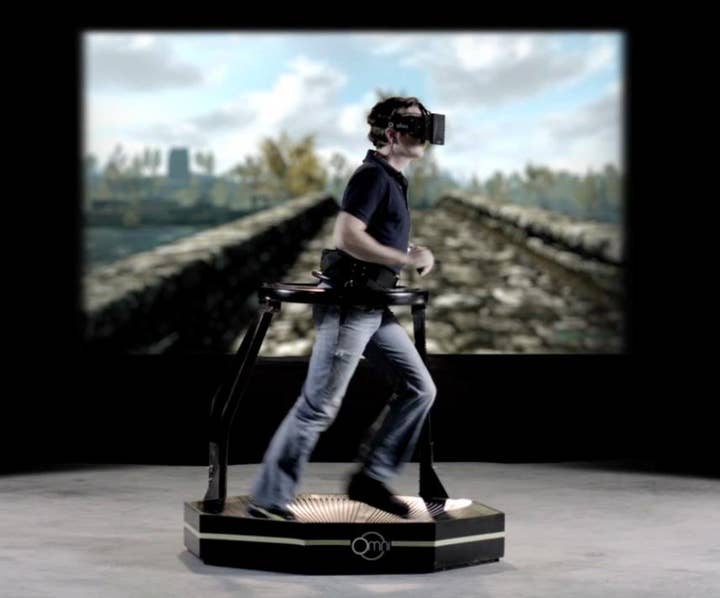"VR is here to stay this time" - Virtuix CEO
The market may not be ready for the Omni VR treadmill just yet, but Jan Goetgeluk would rather his company be early than late
Last week, Virtuix announced a $3 million round of seed funding to complete its flagship product, the Omni virtual reality treadmill. While a far cry from Facebook's $2 billion acquisition of Oculus, the Virtuix investment is yet another indication that investors believe in the potential of virtual reality.
Speaking with GamesIndustry International after the funding was announced, Virtuix CEO Jan Goetgeluk stopped short of crediting the Facebook deal with drumming up investor interest, but nevertheless called it an exciting endorsement for the entire VR field.
"Haptics are fairly complicated; it's very difficult to make it work in a way that's affordable for consumers and accessible for a mass market."
"It certainly validated the message that we've been presenting to investors when fundraising, which is that VR is set to become a mass market new medium, with applications that stretch way beyond gaming," Goetgeluk said. "Social activites, health care, fitness, you name it...VR is not set to stay a niche; it's set to be a mainstream platform."
Facebook isn't the only company trying to turn VR into a mainstream platform. Last month's Game Developers Conference was a coming out party for a number of VR headsets, including Sony's Project Morpheus.
"I think investors now believe and see that given all these headsets coming to market, and given how compelling the experience is--not just for the headsets but the Omni--the bottom line is it's an excellent experience, and it's here to stay," Goetgeluk said. "It's not a fad. It's not just a fun thing to try out. It's an incredible experience and a new medium that will impact various aspects of our daily lives. And investors that tried the experience were convinced, and that's why they invested."
Even with the rush of companies looking to stake their claim in the VR field, the preponderance of activity seems to be in the headset market, with fewer companies looking to tackle the haptic part of the VR equation. Goetgeluk suggested two main reasons for that.

"One, the visual aspect of VR is certainly a crucial part," he said. "If there's no visual element of the VR system, then there's no virtual reality at all. It's also a problem that is easier to solve than haptics. Haptics are fairly complicated; it's very difficult to make it work in a way that's affordable for consumers and accessible for a mass market. The visual problem is an easier nut to crack, and certainly with immediate applications."
Of course, the Omni only addresses one element of that haptic problem. But when asked if Virtuix had plans to tackle other elements to complete the illusion of VR for players, Goetgeluk said the company had more pressing concerns in simply getting Omni to market.
"That's our focus right now; we don't have the resources to do much beyond that at this point," Goetgeluk said, adding, "The pressure is on to deliver a top quality product in a timely manner."
The Omni is set for a release this summer, which poses a potential problem. Virtuix is creating a $500 VR peripheral that is largely reliant on the user having a VR headset as well, but the two biggest names in the field, Sony and Oculus, have yet to even announce commercial release windows for their VR headsets. The idea of being a product "ahead of its time" doesn't really bother Goetgeluk.
"In tech, you're either early or you're late. So we're certainly early, but that's not necessarily a bad place to be," he said.
Given Virtuix's production capacities, showing up to the party early might not be the worst course of action. Virtuix has already sold 3,000 Omni treadmills, and new preorders placed through the company's site aren't estimated to ship until September. The company might not mind arriving a little earlier than the VR headsets, but it definitely needs them to arrive.
"We're a VR product and if VR doesn't take off, then we'll stay a niche product, and that's not the intention."
"We're a VR product and if VR doesn't take off, then we'll stay a niche product, and that's not the intention," Goetgeluk said. "I think VR is an incredible experience, the technology is here, and I think VR is here to stay this time."
That's not the only potential concern critics of the Omni may have. When asked about the difficulty for players to find room to keep a VR treadmill next to their PCs, Goetgeluk said he expects people to be surprised by the final production version of the Omni. The company has made a number of changes to the hardware from what they've been carting along to trade shows.
"That's our prototype, which is made of wood and certainly looks a bit big and clunky," Goetgeluk said. "The final product will be a tad smaller and certainly sleeker looking, smaller than a regular treadmill, and also easy to disassemble and store away. It's not a small product, but I don't think size is necessarily an issue."
Additionally, Goetgeluk brushed aside concerns about developer support for the device. It acts as a plug-and-play substitute for a gamepad or keyboard, and developers who choose to actively support the Omni can access more advanced features, such as mapping travel speed in the game with the player's speed on the Omni, or to decouple the walking direction from the looking direction. Virtuix is also creating its own demo, TRAVR, to showcase how the Omni could be integrated with traditional first-person shooter and horror games.
Finally, Virtuix needs to figure out how to get people to experience gaming with Omni first-hand. Appearances at trade shows have been a good first step and one Virtuix will continue pursuing, but the company is also considering placing Omni demos in certain retail stores or malls.
"We certainly want to make it as feasible as possible for people to try out, because it's a device where when you try it, that's when you realize its potential," Goetgeluk said.

